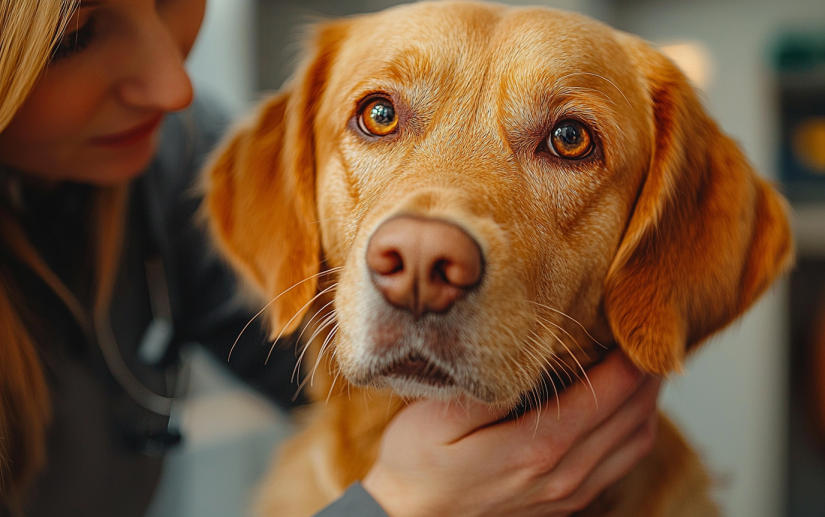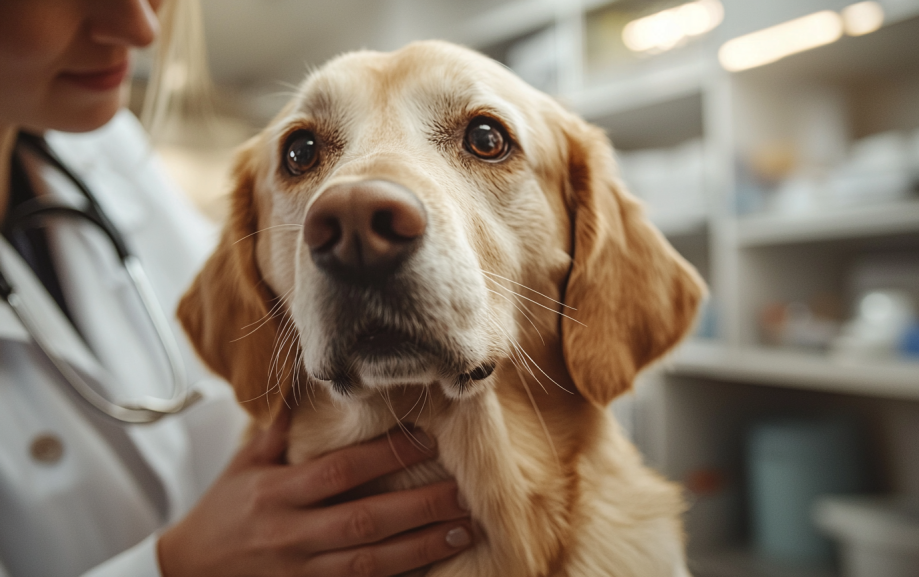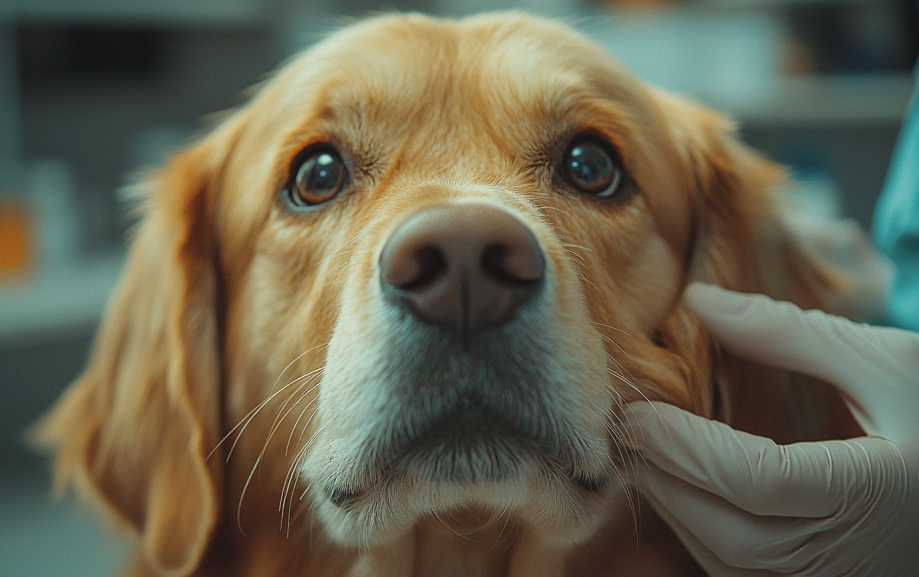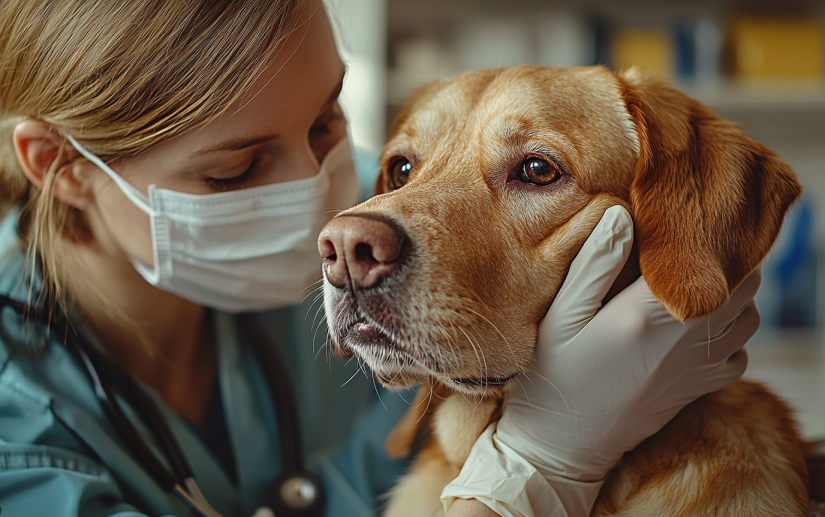What Causes Dog Ear Infections?
Bacteria and Yeast Infections
One of the most common causes of dog ear infection is bacterial or yeast overgrowth. The ears provide a warm, moist environment, which makes them an ideal breeding ground for these organisms, particularly in dogs with floppy ears or those who swim often.
Ear Mites
Ear mites are microscopic parasites that can infest your dog’s ears, leading to irritation and inflammation. These tiny pests can cause excessive scratching and a buildup of dark, crumbly discharge in the ear canal.
Allergies
Environmental or food allergies can cause inflammation in the ear, making it more prone to infection. Dogs with chronic ear infections often suffer from underlying allergies that exacerbate their condition.
Moisture Buildup
Moisture from swimming, bathing, or even humid environments can contribute to ear infections. When water becomes trapped inside the ear canal, it creates a favorable environment for bacteria and yeast to thrive.
Common Symptoms of Dog Ear Infections
Redness and Swelling
If your dog’s ear looks red or swollen, it’s a clear sign of irritation or infection. This is often accompanied by discomfort, which you may notice through behavioral changes.
Odor
A foul smell coming from your dog’s ears could indicate a bacterial or yeast infection. This odor is typically noticeable even from a distance, making it one of the easier symptoms to detect.
Head Shaking and Scratching
Excessive head shaking and scratching at the ears are common signs of discomfort. Your dog may also rub its head against furniture or the floor in an attempt to relieve the irritation.
Discharge
Ear infections often cause discharge from the ear canal. This can range from yellow or brown pus to a dark, crumbly substance that resembles coffee grounds (often a sign of ear mites).
Hearing Loss or Balance Issues
In severe cases, your dog may experience hearing loss or balance problems. This usually indicates that the infection has reached deeper parts of the ear and requires immediate veterinary attention.
READ ALSO: Dog Dental Health: Practical Tips for a Healthy Smile
Types of Dog Ear Infections

Otitis Externa
Otitis externa refers to an infection of the external part of the ear canal. It’s the most common type of ear infection in dogs and can usually be treated with topical medications and good hygiene practices.
Otitis Media
When the infection spreads to the middle ear, it’s known as otitis media. This condition is more severe and may require oral medications or more intensive treatment from a veterinarian.
Otitis Interna
Otitis interna is an infection of the inner ear, and it’s the most serious type. It can cause permanent hearing loss and neurological issues if not treated promptly. Otitis interna often requires a combination of oral antibiotics and possible surgical intervention.
Home Remedies for Dog Ear Infections
Cleaning Your Dog’s Ears
Regular ear cleaning can help prevent and treat mild infections. Use a vet-approved ear cleaner and cotton balls to gently clean the outer part of your dog’s ear. Avoid using cotton swabs, which can push debris further into the ear canal.
Apple Cider Vinegar
Apple cider vinegar has natural antibacterial and antifungal properties. Dilute it with equal parts water, then use a cotton ball to apply the mixture to the affected ear. Be careful not to use this remedy if your dog’s ear is raw or bleeding, as the vinegar can sting.
Coconut Oil
Coconut oil is known for its soothing and antimicrobial properties. Warm up a small amount and gently apply it to the ear canal using a cotton ball. This can help reduce irritation and combat bacterial growth.
Olive Oil and Garlic
A mixture of olive oil and garlic can act as a natural antiseptic. Warm a small amount of olive oil with a crushed clove of garlic, strain the garlic, and allow the oil to cool before applying a few drops into the ear.
Calendula Oil
Calendula oil is a natural anti-inflammatory that can soothe irritated skin. Apply a few drops to the ear using a dropper, especially if your dog’s ear infection is causing visible discomfort or inflammation.
When to See a Veterinarian
Persistent Symptoms
If your dog’s symptoms persist for more than a few days, even with home treatment, it’s time to visit the vet. Chronic ear infections can lead to permanent damage if not treated appropriately.
Severe Discharge or Bleeding
If you notice severe discharge, bleeding, or a strong odor that won’t go away, your dog likely needs prescription medications to clear the infection.
Signs of Pain or Lethargy
If your dog is in pain or appears lethargic, the infection may have progressed to the middle or inner ear. These cases can be more challenging to treat and may require antibiotics, antifungal medications, or even surgery.
Veterinary Treatments for Dog Ear Infections

Antibiotics and Antifungals
For bacterial and yeast infections, your veterinarian may prescribe antibiotics or antifungal medications. These can come in the form of ear drops, oral medications, or both, depending on the severity of the infection.
Ear Flushes
In cases of heavy discharge or debris buildup, your vet may perform an ear flush to clean out the ear canal. This is usually done under mild sedation to avoid causing your dog discomfort.
Surgery
In severe or chronic cases, where infections become recurring and resistant to treatment, surgical options such as a total ear canal ablation (TECA) may be necessary. This procedure involves removing the diseased ear canal to prevent future infections.
Anti-Inflammatory Medications
Your vet may also prescribe anti-inflammatory medications to reduce swelling and relieve discomfort in the ear. These medications can help improve your dog’s comfort level and prevent long-term damage.
Preventing Future Ear Infections
Regular Ear Cleaning
To keep your dog’s ears healthy, practice regular ear cleaning using a vet-recommended cleaner. Make sure to dry your dog’s ears thoroughly after bathing or swimming to prevent moisture buildup.
Managing Allergies
If your dog has allergies, work with your vet to manage them through diet, medications, or allergy shots. Controlling allergies can greatly reduce the likelihood of recurrent ear infections.
Balanced Diet and Supplements
A well-balanced diet rich in omega-3 fatty acids can improve your dog’s overall skin and coat health, including the ear canals. Probiotic supplements may also help balance the yeast and bacteria levels in your dog’s body.
Regular Vet Checkups
Routine vet visits can catch ear infections early and ensure your dog’s ears stay healthy. Your vet can recommend specific products or preventive measures based on your dog’s breed and lifestyle.
Dog Breeds Prone to Ear Infections
Breeds with Floppy Ears
Dogs with floppy ears, like Cocker Spaniels, Basset Hounds, and Beagles, are more prone to ear infections. The shape of their ears can trap moisture and debris, making them a breeding ground for bacteria.
Breeds with Hairy Ear Canals
Breeds like Poodles and Shih Tzus have more hair inside their ear canals, which can trap dirt and moisture. Regular grooming and ear cleaning are essential for these breeds to prevent infections.
Breeds Prone to Allergies
Certain breeds, such as Bulldogs and Labrador Retrievers, are more susceptible to allergies, which can trigger frequent ear infections. Managing allergies with the help of a vet can reduce the risk.
The Link Between Ear Infections and Diet in Dogs
Food Allergies
Food allergies are a lesser-known contributor to chronic ear infections in dogs. Proteins like beef, chicken, or dairy are common allergens that can cause inflammation throughout the body, including the ears. If your dog suffers from recurring ear infections, consider switching to a hypoallergenic diet after consulting your vet.
Omega-3 Fatty Acids
Omega-3 fatty acids, found in fish oil and flaxseed, have anti-inflammatory properties that can help manage ear infections, especially in dogs with chronic conditions. Adding these to your dog’s diet may reduce the frequency of infections and promote overall ear health.
Probiotics for Ear Health
Probiotics help maintain a balanced microbiome, not just in your dog’s digestive system, but also in the skin and ears. Including probiotics in your dog’s diet may help to naturally prevent ear infections by balancing the levels of bacteria and yeast in the body.
How to Safely Clean Your Dog’s Ears at Home

What You Need
To clean your dog’s ears at home, gather the following supplies:
- Vet-approved ear cleaner
- Cotton balls or gauze
- Towels (in case of mess)
- Treats to keep your dog calm
Step-by-Step Guide
- Prepare your dog: Calm your dog by speaking softly and giving them treats to create a positive association with ear cleaning.
- Apply the cleaner: Gently lift your dog’s ear flap and squeeze a few drops of the ear cleaner into the ear canal.
- Massage the ear: Massage the base of the ear to help the cleaner break up any debris. You should hear a squishing sound.
- Wipe the ear: Use a cotton ball or gauze to wipe away dirt and debris from the outer ear. Avoid inserting anything deep into the ear canal, which could cause damage.
- Let your dog shake: After cleaning, let your dog shake their head to expel any remaining liquid.
- Reward: Finish with a treat to ensure your dog remains cooperative for future cleanings.
Natural Supplements to Support Ear Health
Quercetin
Quercetin is a natural anti-inflammatory and antioxidant often referred to as “nature’s Benadryl.” It can help manage allergic reactions that lead to ear infections in dogs. Adding quercetin supplements or feeding your dog quercetin-rich foods like apples and berries may reduce the frequency of infections.
Colostrum
Bovine colostrum is another supplement that supports immune health. It can help dogs with allergies or chronic ear infections by reducing inflammation and enhancing the immune system’s ability to fight off infections naturally.
Zinc
Zinc is essential for skin health, including the delicate skin inside the ear canal. Dogs with zinc deficiencies may experience more frequent ear infections. Consider incorporating zinc-rich foods like turkey, lamb, and pumpkin into your dog’s diet or using a zinc supplement.
Conclusion
Dog ear infections are a common but manageable issue, and understanding the causes, symptoms, and treatment options can make all the difference in your dog’s comfort and health. Whether you’re trying home remedies or seeking professional veterinary care, early intervention and proper prevention are key to keeping your dog’s ears healthy in the long run. Regular ear cleaning, a balanced diet, and proactive vet visits are all simple steps you can take to prevent future infections. With the right approach, your dog can enjoy a life free of painful and recurring ear infections.





